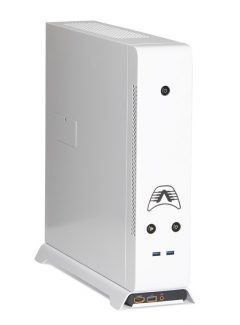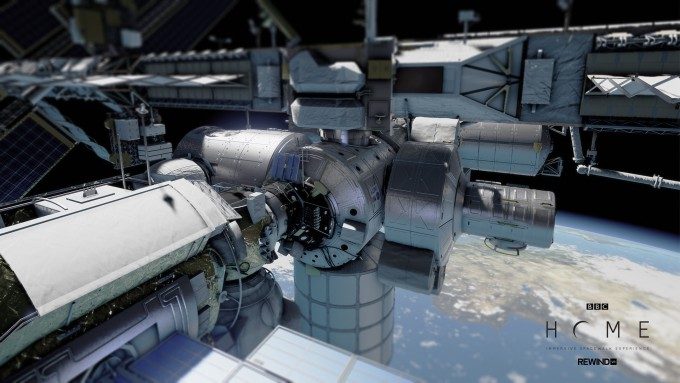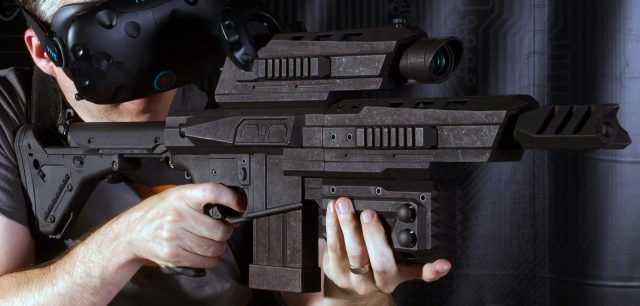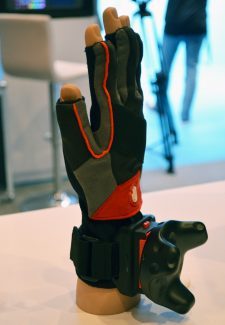VRLO, the UK’s leading meetup for virtual reality practitioners and enthusiasts, had its seventh edition on March 20th. Hosted by Rewind, in association with Advertising Week Europe, VRLO 7 attracted 350 attendees who glimpsed the present and future of VR and AR from Epic Games, HTC, BBC Studios, and more. Road to VR’s Jon Tustain brings us interviews and coverage from the event.
Amid varied content at the event, Epic Games presented the recently released and highly acclaimed Robo Recall. The title, which is free for Oculus Touch users, sees you take on the role of an agent tasked with blasting rogue robots.

High end PC specialists Armari used the event to showcase their compact V25 Slim Micro-tower, a workstation designed specifically for designers of professional VR content. The hardware features dedicated VR front buttons for quick access and a built-in box cage to integrate HTC VIVE components for a ‘cleaner look’.
To showcase the computer’s integrated Radeon Pro WX 7100 (which AMD claims is the world’s most powerful single-slot workstation GPU, capable of 5.73 TFLOPS of compute performance) Armari used the system to power BBC Learning’s Home: VR Spacewalk. As part of the BBC’s mission to inspire the next generation of scientists and explorers, the experience allows users to get to feel of what it’s like to be an astronaut floating 250 miles above earth. Oculus owners can download the experience here.
 360 degree content catalogue company Blend Media were on hand to present some of their clips on a VR Sphere. In the context of Advertising Week Europe, they claim 43% of media buyers say 360 degree video will be the largest area for video growth in 2017, with a 28% higher view rate and 4.5% click through rate vs 0.5% of fixed video.
360 degree content catalogue company Blend Media were on hand to present some of their clips on a VR Sphere. In the context of Advertising Week Europe, they claim 43% of media buyers say 360 degree video will be the largest area for video growth in 2017, with a 28% higher view rate and 4.5% click through rate vs 0.5% of fixed video.
Rewind announced its acceptance into the Microsoft HoloLens Agency Readiness Partner Program, which was recently expanded to six European companies who each benefit from extensive hands on training and a view inside the Microsoft curtain.
The company’s proof-of-concept Flight Deck mixed reality HoloLens experience, based on the Red Bull Air Race, proposed what the future of live sports could look like. Produced within 12 weeks, the user can look down at a 3D visualisation of the Abu Dhabi Red Bull Air race, seeing an overhead view of the planes fly through the course positioned by real time telemetry data. Synced to a regular TV, the user can use air gesture to select a competitor from the holographic space, to switch to their POV on the television.
Co-founder of Rewind, Solomon Rogers, described how he sees this as a way to offer the drama of replays and analysis to people who attend sports games. For example, in the context of an NFL game, spectators could view player profiles, overhead views of GPS tracked players movement trails, possession averages or augmented First Down and Line of Scrimmage lines, all from their seats in the auditorium.
 HTC showed off some of the accessories they announced at CES at make use of the new Vive Tracker. As we reported from CES, the arcade VR-15 gun by VRsenal is weighted like a real gun and adds haptics to add further realism to games. The VR-15 was fitted with a Tracker, the lighthouse compatible puck which is now available for $99.
HTC showed off some of the accessories they announced at CES at make use of the new Vive Tracker. As we reported from CES, the arcade VR-15 gun by VRsenal is weighted like a real gun and adds haptics to add further realism to games. The VR-15 was fitted with a Tracker, the lighthouse compatible puck which is now available for $99.
 Among other Tracker peripherals at VRLO was the Hi5 VR Gloves by Noitom. We were impressed with the glove’s combination of finger tracking and motion input when we first tried them at CES. Pricing has now been revealed at $300 for the pair, with a development kit due out in June (complete with C++, UE4 and Unity SDK) and a commercial product expected in September. A developer sign-up sheet is expected to be posted on the Hi5 VR Glove website soon.
Among other Tracker peripherals at VRLO was the Hi5 VR Gloves by Noitom. We were impressed with the glove’s combination of finger tracking and motion input when we first tried them at CES. Pricing has now been revealed at $300 for the pair, with a development kit due out in June (complete with C++, UE4 and Unity SDK) and a commercial product expected in September. A developer sign-up sheet is expected to be posted on the Hi5 VR Glove website soon.
For a roundup of interviews from VRLO 7, see the video heading this article.






